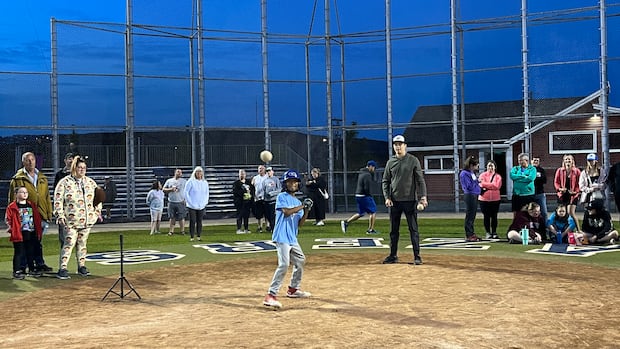
When Lyndon Andersen held a baseball bat and lifted it enough to tap a ball of the batting tee for the first time this summer, it was a big moment for him — and for his mother Adina Stamp.
“I can cry right now, even speaking about it. It’s just remarkable. I never thought he’d be able to do something like that,” said Stamp.
“I mean, he’s not hitting it out of any home runs but he’s knocking it off that tee. That’s a home run in my eyes.”
Nine-year-old Andersen has cerebral palsy and a global developmental delay, and uses a wheelchair. He has been playing baseball for six years — not in the minor league, though. He is enrolled in Challenger Baseball, a program for athletes with disabilities.
Despite being told that the program caters to all abilities before Andersen’s first practice, Stamp still didn’t quite know what to expect.
“I’m like, ‘How is he going to understand the concept of baseball?'” she said.
“You don’t have to know the concept of baseball. You come in, you throw the balls around. Everybody can hit the ball. Whether you’re doing it on your own, whether you’re using a tee, your parents are helping you.… That’s how inclusive this program is.”
Nobody gets tagged out
Ever since then, the family has barely missed a session.
Challenger Baseball, offered by the Jays Care Foundation under the Toronto Blue Jays, aims to bring the sport to children and young adults with disabilities, like Andersen, whether cognitive, physical or developmental.
Its focus is on teaching them baseball skills, like catching and throwing a ball, as well as on improving hand-eye co-ordination and movement generally. Unlike a regular game of baseball, every player gets to bat and nobody gets tagged out.
A special baseball program in St. John’s offers sessions to children and young adults with disabilities, helping them improve their physical and social skills. With the season’s last practice under their belt, it’s not just the athletes who are already looking forward to next year, as the CBC’s Henrike Wilhelm reports.
The program, which was brought to Newfoundland by Colin Rose in 2016, is currently offered in St. John’s from June to September, and, since this year, also in Corner Brook.
It is free of charge, and provides all necessary supplies to the athletes, including clothes, which Stamp said is a rare find.
“Living in the special needs community, it’s very isolating. There aren’t a lot of programs out there,” she said.
“You’re grasping at straws. It’s tough. It’s really tough … Sports are expensive. But to come into a free program and one that is so inclusive, you couldn’t ask for any better.”

Provincial co-ordinator Brooke Squires knows all about what the program means to families.
“A lot of our kids don’t really have the opportunity to go out and play baseball, but this is a great program. It’s very adaptive. So, they can swing the bat from their chairs or use their walkers.… And we just have a lot of fun,” said Squires.
“It’s really, really something they get to look forward to. And a lot of them love watching baseball.”
In addition to improving their mobility and gross motor skills, said Squires, the sessions also help them develop social skills — on, and off, the field.
“Their friends at baseball become their real-life friends,” she said. “Building those connections is not so easy for someone with a disability, sometimes. And the parents really want those kids to have that friendship, too.”
Adult sessions in the wings
Although the program is mainly targeted toward children, said Squires, ages range from two to over 30. While in the beginning, only about a dozen participants were signed up, there are now more than 100 — and that number continues growing every year.
Going forward, said Squires, organizers hope to expand Challenger Baseball by also offering adult session.
Further growing the program is also what Julia Crocker is hoping for. The 19-year-old is one of about 20 volunteers who were signed up for this season and without whom the sessions wouldn’t be possible.
Acting as a buddy, Crocker helps athletes bat and run between bases, and with anything else they need.
Yet, when she first started with Challenger Baseball in 2016, it was as one of the program’s first participants.
“I have a physical disability. So, there wasn’t a whole lot of activities that were considered normal activities that, I guess, anyone could do. And this is a really inclusive program for everyone,” said Crocker.
“I noticed myself getting a lot more involved. When I first started, I was very much like, ‘Mom, I’m not going to like this.’ And now every week, pretty much, I’m attending.”

Being involved with the program, she said, is “the highlight of [her] summer” — and she knows the players feel the same way.
“I love getting to see their smiles. I love how all the barriers are just gone out of the window. As soon as they enter the baseball field, anything is possible,” said Crocker.
“Hearing their laughter, as I push someone in a wheelchair. Just hearing them laugh because we’re going so fast, and they can feel the wind on their necks and their hair. It’s amazing.”
As Stamp pushes her son from base to base during the season’s last session, for her, it’s also all about that smile on his face.
“To be included, to be playing with all of his buddies, to be learning new skills, I think it means everything to him,” she said.
“We’re all cheering for each other. We came here as strangers and we’re leaving as one big family.”
Download our free CBC News app to sign up for push alerts for CBC Newfoundland and Labrador. Click here to visit our landing page.






